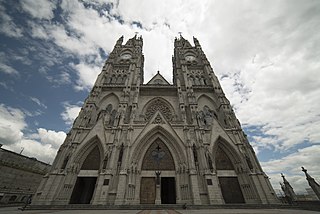
Christianity is the predominant religion in the Philippines, with Roman Catholicism being its largest denomination. Sizeable Muslim and non-religious minorities are also present.

Christianity is the most widely professed religion in Argentina, with Roman Catholicism being its largest denomination. This historical background is very much due to the Spanish influence brought about through the newly conquered territories. However, affiliation with Protestant churches is increasing and immigration throughout the 20th century has brought other religions from various regions to Argentina.

Protestant denominations arrived in the Philippines in 1898, after the United States took control of the Philippines from Spain, first with United States Army chaplains and then within months civilian missionaries.

Christianity is the most prevalent religion in the United States. Estimates from 2021 suggest that of the entire U.S. population about 63% is Christian. The majority of Christian Americans are Protestant Christians, though there are also significant numbers of American Roman Catholics and other Christian denominations such as Latter-day Saints, Orthodox Christians and Oriental Orthodox Christians, and Jehovah's Witnesses. The United States has the largest Christian population in the world and, more specifically, the largest Protestant population in the world, with nearly 210 million Christians and, as of 2021, over 140 million people affiliated with Protestant churches, although other countries have higher percentages of Christians among their populations. The Public Religion Research Institute's "2020 Census of American Religion", carried out between 2014 and 2020, showed that 70% of Americans identified as Christian during this seven-year interval. In a 2020 survey by the Pew Research Center, 65% of adults in the United States identified themselves as Christians. They were 75% in 2015, 70.6% in 2014, 78% in 2012, 81.6% in 2001, and 85% in 1990. About 62% of those polled claim to be members of a church congregation.

Christianity in Nigeria accounted for an estimated 46.18% of the Nigerian population in 2020; two-thirds of Christians in Nigeria are Protestant.

Christianity is the dominant religion in El Salvador. The Catholic share of the population is on decline while Protestantism is experiencing rapid growth in recent decades. The Spanish Conquistador Pedro de Alvarado named part of the territory of modern day El Salvador after Jesus Christ - San Salvador. The territory's name, including the province of San Miguel, was later extended to the Provincia De Nuestro Señor Jesus Cristo, El Salvador Del Mundo, shortened to the Republic of El Salvador, or Salvador, during the post-Federal Republic period and subsequently settled on as El Salvador.

When it comes to religion, the Ecuadorian society is relatively homogeneous, with Christianity being the primary religion. Roman Catholicism is the main Christian denomination in the country. There are also minorities of other religions.

Religion in Guyana is diverse, with Christianity being the most widely professed faith.
Christianity is the predominant religion in Paraguay, with Catholicism being its largest denomination. Before the arrival of Spanish missionaries, the people residing in the territory of modern day Paraguay practiced a variety of religions.

Christianity is the largest religion in Cape Verde, with Roman Catholics having the most adherents. Different sources give varying estimates on the relative sizes of various Christian denominations. More than 94% of the population of Cape Verde is Christian, with almost 85% being Roman Catholic. About 5% of the population is Protestant. The largest Protestant denomination is the Church of the Nazarene. Other groups include the Church of the Nazarene, the Assemblies of God, Seventh-day Adventist Church, the Universal Church of the Kingdom of God, independent Baptists and various other Pentecostal and evangelical groups.

Christianity is the largest religion in Nauru, with Nauru Congregational Church being the largest denomination, encompassing 35.71% of the population as of the 2011 census.

The predominant religion in Panama is Christianity, with Catholicism being its largest denomination. Before the arrival of Spanish missionaries, the various ethnic groups residing in the territory of modern day Panama practiced a multitude of faiths.

Christianity is the largest religion in Venezuela, with Catholicism having the most adherents.

Haiti is a majority Christian country. Figures in 2020 suggest that 93% of the population belong to a Christian denomination.

Christianity is the largest religion in Cape Verde, with Roman Catholics having the most adherents. Different sources give varying estimates on the relative sizes of various Christian denominations. More than 94% of the population of Cape Verde is Christian, with almost 85% being Roman Catholic. About 5% of the population is Protestant. The largest Protestant denomination is the Church of the Nazarene. Other groups include the Church of the Nazarene, the Assemblies of God, Seventh-day Adventist Church, the Universal Church of the Kingdom of God, independent Baptists and various other Pentecostal and evangelical groups.
The Constitution of Panama provides for freedom of religion.

The main religion traditionally practiced in Latvia is Christianity. As of 2019, it is the largest religion (68.84%), though only about 7% of the population attends religious services regularly.

Christianity in Niger was brought with French colonial institutions, and its adherents include local believers from the educated, the elite, and colonial families, as well as immigrants from neighboring coastal countries, particularly Benin, Togo, and Ghana.
Mauritius is a religiously diverse nation, with Hinduism being the most widely professed faith. People of Indian descent (Indo-Mauritian) follow mostly Hinduism and Islam. The Franco-Mauritians, Creoles and Sino-Mauritians follow Christianity. A minority of Sino-Mauritians also follow Buddhism and other Chinese-related religions.
Lebanese Protestant Christians refers to Lebanese people who are adherents of Protestantism in Lebanon.















